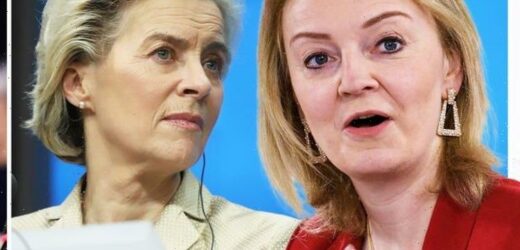Lord Frost gives update on UK’s participation in Horizon Europe
We use your sign-up to provide content in ways you’ve consented to and to improve our understanding of you. This may include adverts from us and 3rd parties based on our understanding. You can unsubscribe at any time. More info
Horizon Europe is the EU’s £84billion key research and innovation that the UK was set to participate in. The UK was set to contribute £15billion over a seven-year period so British scientists and institutions could access the EU’s pool of funding. But the UK was banned from participating in the project until it resolves the Brexit disputes with the bloc, including the Northern Ireland protocol.
The bloc made the move despite the fact that Britain’s participation was a feature of the EU–UK Trade and Cooperation Agreement.
Now, Ms Truss has threatened to trigger Article 16, which would mean Britain’s participation would be taken off the table permanently.
The Foreign Secretary warned the bloc that Britain would overhaul the post-Brexit agreement over Northern Ireland unilaterally if she cannot reach a “negotiated solution” with the EU.
She said: “My priority is to protect peace and stability in Northern Ireland. I want a negotiated solution but if we have to use legitimate provisions including Article 16, I am willing to do that.
“This safeguard clause was explicitly designed – and agreed to by all sides – to ease acute problems because of the sensitivity of the issues at play.


“The EU has already invoked this article to introduce a hard border for vaccine exports and, even in the act of withdrawing it, insisted on its right to do so again in the future.”
Ms Truss appears to be echoing the hard line that her predecessor, Lord David Frost, took during his tenure as Brexit Minister up until his resignation last month.
Lord Frost had also suggested that Article 16 was seriously being considered by the UK.
European Vice Commissioner Maros Sefcovic warned Lord Frost that this would have “serious consequences”.
This also comes as Ms Truss and Mr Sefcovic are set to meet for the first time on Thursday.

It had been thought earlier that Ms Truss was going to take a “softer” approach than her predecessor.
Charles Grant, director of the Centre for European Reform thinktank, said: “With David Frost’s departure, there’s at least a chance of a bit of a reset in the EU-UK relationship because people in Brussels reckoned so long as he was there they couldn’t have a much better relationship.
“Even before David Frost resigned there were signs of the British softening their position by saying that they didn’t insist that the European Court of Justice be taken out of the equation altogether in the protocol.
He added: “If I’m right that the British want to reach a deal with Northern Ireland, that holds up hope for Horizon.”
But that position does not seem as likely anymore, with Ms Truss appearing to take a much harder stance than first thought.
DON’T MISS
Yellowstone supervolcano warning after magma chamber discovery [REPORT]
NO fourth Covid vaccine needed as new booster guidance given [INSIGHT]
Mystery bite mark on Great White Shark sparks Megalodon theory [REVEAL]


Ms Truss said: “Let me be clear: I will not sign up to anything which sees the people of Northern Ireland unable to benefit from the same decisions on taxation and spending as the rest of the UK, or which still sees goods moving within our own country being subject to checks.”
And while Britain may never be allowed to re-join Horizon Europe once Article 16, Science Minister George Freeman has been drafting up a “Plan B”.
The first steps have involved handing out £17million to 12 UK projects that are collaborating with partners overseas.
While it is only a drop in the ocean compared to the bloc’s £80billion funding pool, experts told Express.co.uk that they are “relieved” to see the UK get the ball rolling on overseas collaborations.
The investment came from the Engineering and Physical Sciences Research Council (EPSRC), part of UK Research and Innovation (UKRI).
It brings together some of the world’s leading research groups, both in Britain and internationally.
Source: Read Full Article


